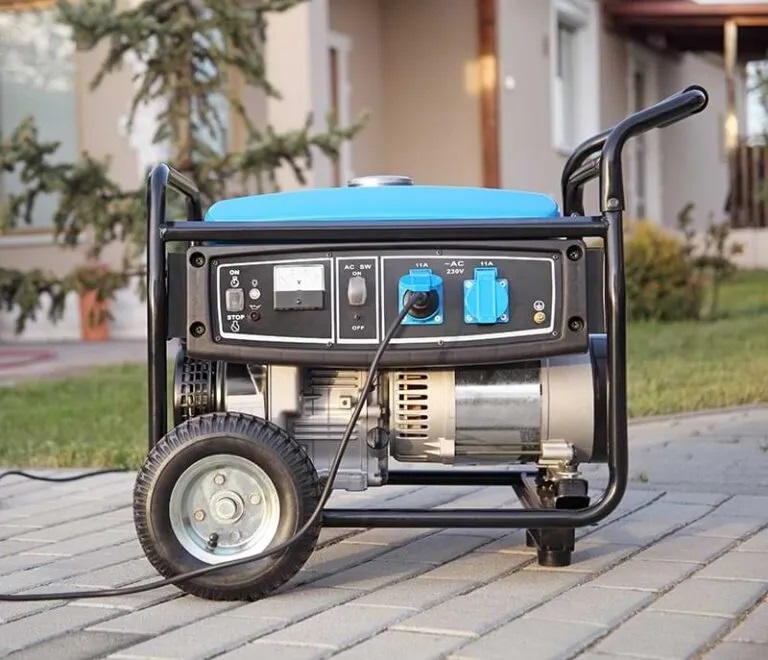At HES, we recognize the importance that electricity plays in the daily lives of our customers. Our goal is to keep the electricity flowing every minute of every day. But occasionally, mother nature thwarts our efforts, sending ice storms, thunderstorms and tornadoes, that damage the electric system, causing outages. If you’ve experienced an outage of multiple hours, you know the inconvenience it causes. Life seems to come to a standstill waiting for the power to come back on. And there’s always the anxiety of wondering whether food in the refrigerator and freezer will spoil. Fortunately, there is an alternative to waiting for the power to be restored. You can purchase a backup generator for your home.
 Backup generators tend to fall into two categories. The first is the whole home generator. These higher capacity generators are capable of producing between 20-25 kilowatts of power and are sized to run everything in your house. During an outage, these generators come on automatically and provide enough power to allow you use your electrical powered devices and appliances as normal. The average installed cost for a whole home generator is $15,000 and requires a professional installation. These generators are installed outside next to your home, and are permanently wired into your home’s electrical system. Most feature an automatic transfer switch, which senses an outage, then sends a signal for the generator to start, transferring the home to the generator’s power once it is running. They are usually plumbed into existing LP or natural gas sources. A whole home generator essentially eliminates the threat of a power outage, duplicating the power provided by your electric utility.
Backup generators tend to fall into two categories. The first is the whole home generator. These higher capacity generators are capable of producing between 20-25 kilowatts of power and are sized to run everything in your house. During an outage, these generators come on automatically and provide enough power to allow you use your electrical powered devices and appliances as normal. The average installed cost for a whole home generator is $15,000 and requires a professional installation. These generators are installed outside next to your home, and are permanently wired into your home’s electrical system. Most feature an automatic transfer switch, which senses an outage, then sends a signal for the generator to start, transferring the home to the generator’s power once it is running. They are usually plumbed into existing LP or natural gas sources. A whole home generator essentially eliminates the threat of a power outage, duplicating the power provided by your electric utility.
The second category of home generator is the smaller, portable generator. These generators tend to have a capacity of 10 kilowatts or less, and are typically run by air-cooled, gasoline engines. Most of these generators come on wheels, allowing them to be easily moved to wherever they are needed. Although these generators are much cheaper, typically starting at around $500, they are only capable of powering a few  devices. These generators can be connected to the devices to be powered in a number of ways. The easiest is to plug the devices directly into the generator itself. An electrician can also install a generator connection point near your current electrical panel and an interlock lever in your electrical panel. When the generator is needed, a cable is run between the generator output and the connection point. To allow the generator to feed the electrical panel requires turning off the main breaker and moving an interlock lever to allow the generator breaker to be switched on. The interlock lever prevents the generator from back feeding electricity onto the grid, potentially electrocuting utility lineman who may be working on the lines near the home. Regardless of how a portable generator is connected, it is up to the homeowner to manage the load attached to the generator to keep the generator’s internal breakers from tripping from excessive loading. It is extremely important that these generators be positioned outside, away from the house, so that exhaust fumes do not feed back towards the house, potentially poisoning the homeowners.
devices. These generators can be connected to the devices to be powered in a number of ways. The easiest is to plug the devices directly into the generator itself. An electrician can also install a generator connection point near your current electrical panel and an interlock lever in your electrical panel. When the generator is needed, a cable is run between the generator output and the connection point. To allow the generator to feed the electrical panel requires turning off the main breaker and moving an interlock lever to allow the generator breaker to be switched on. The interlock lever prevents the generator from back feeding electricity onto the grid, potentially electrocuting utility lineman who may be working on the lines near the home. Regardless of how a portable generator is connected, it is up to the homeowner to manage the load attached to the generator to keep the generator’s internal breakers from tripping from excessive loading. It is extremely important that these generators be positioned outside, away from the house, so that exhaust fumes do not feed back towards the house, potentially poisoning the homeowners.
Choosing a backup generator requires deciding exactly what you want to power during an outage. Most generator manufacturers’ websites feature an online calculator to help you determine the size of generator you’ll need based on what you want to power. Whatever type of generator is chosen, it is extremely important that the homeowner fully understands how to safely and properly operate the generator, especially when it comes to portable generators.
For more information, visit the websites of reputable home generator manufacturers including: Generac, Kohler, Cummins, Honda and Briggs &Stratton.